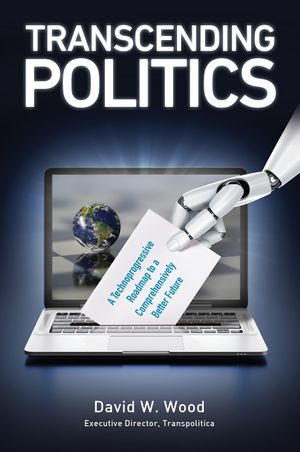Chapter 12. "Humans and superhumans"
Chapter 12. "Humans and superhumans" is the title of the twelfth Chapter in the book Transcending Politics by David Wood.

"Is it possible to significantly improve politics, over the course of, say, the next dozen years, without first significantly improving human nature?
- In this chapter, I’ll look at four different answers to this question:
- We shouldn’t try to improve human nature; that’s the route to hell
- We can have a better politics without any change in human nature
- Improving human nature will turn out to be relatively straightforward; let’s get cracking
- Improving human nature will be difficult but is highly desirable; we need to carefully consider the potential scenarios, with an open mind, and then make our choices."
Angels and demonsПравить
We humans are sometimes angelic, yet sometimes diabolic.
The new human in historyПравить
For as long as history has been recorded, humans have been turning over a new leaves in their lives. as a result of a dramatic personal experience - perhaps involving a shock or disappointment, or seeing the inspiring example of someone else, or finding a novel way of looking at the world - people have set aside former habits an attitudes.
Year ZeroПравить
A healthy open society depends on elements - journalists and other researchers - that determinedly seek out evidence of the actual impact of government policies. It does not rely simply on official accounts.
Utopia and ExtropiaПравить
Do utopian experiments always turn out bad? What is the right conclusion to draw from the dreadful examples of the Khmer Rouge in Cambodia, Maoist experimentation in China, and the Bolshevik revolution in the Soviet Union?
Page 329 reads, Under the primary authorship of Max More, the statement of Extropian principles evolved over the years, culminating in 2003 in version 3.11.
Pragmatically envisioning better humansПравить
The technoprogressive transformation of society and human nature that I envisioned will build upon the important insights of the extropian principles.
Page 331 reads, "Accordingly, let's now take a moment to explore features of the human character that there's a strong case to seek to improve. Then we can move on to consider potential ways to carry out such improvements.
The character features I'm aiming to list are those which, if they are not tamed, threaten to combine in devastating ways with the greater powers that technology as a whole is putting in our hands.
These features include Dysfunctional emotions, Overconfidence, Confirmation bias, Abuse of power, In-group preference, Over-attachment, Herd mentality, Loss of perspective."
The technoprogressive feedback cycleПравить
One criticism of the initiative I've just outline is that it puts matters the wrong way round.
I've been describing how individuals can, with the aid of technology as well as traditional methods, raise themselves above their latent character flaws, and can therefore make better contributions to the political process (either as voters or as actual politicians) In other words, we'll get better politics as a result of getting better people.
The Transhumanist DeclarationПравить
... was the fruit of an open collaborative process. The first published version dates from July 1998.[1]
Practical transhumanismПравить
One of the most important developments within the overall transhumanist community, in the last few years, has been the growth of workshops and summits dedicated to "biohacking".
Legislation impacting transhumanismПравить
One complaint made by reviewers of the book Stealing Fire is that several of the recommendations it contains fall foul of local or national laws. The rich, powerful, and resourceful people covered in the book have their own means of acquiring the smart drugs championed by the authors. But many readers aren't in such a position.
Towards enhancementПравить
Underlying much of the legislative opposition to transhumanist technologies, such a smart drugs, is the philosophical viewpoint that claims there's a fundamental distinction between “therapies” and “enhancement”:
- Therapies can repair humans to a normal state of health and functioning and are to be encouraged
- Enhancement would bring humans to levels of health and functioning beyond what is normal and are to be resisted.
External linksПравить
ReferencesПравить
- ↑ “The Transhumanist Declaration (2.4)” https://web.archive.org/web/19980702105748/http://www.transhumanism.com/declaration.htm